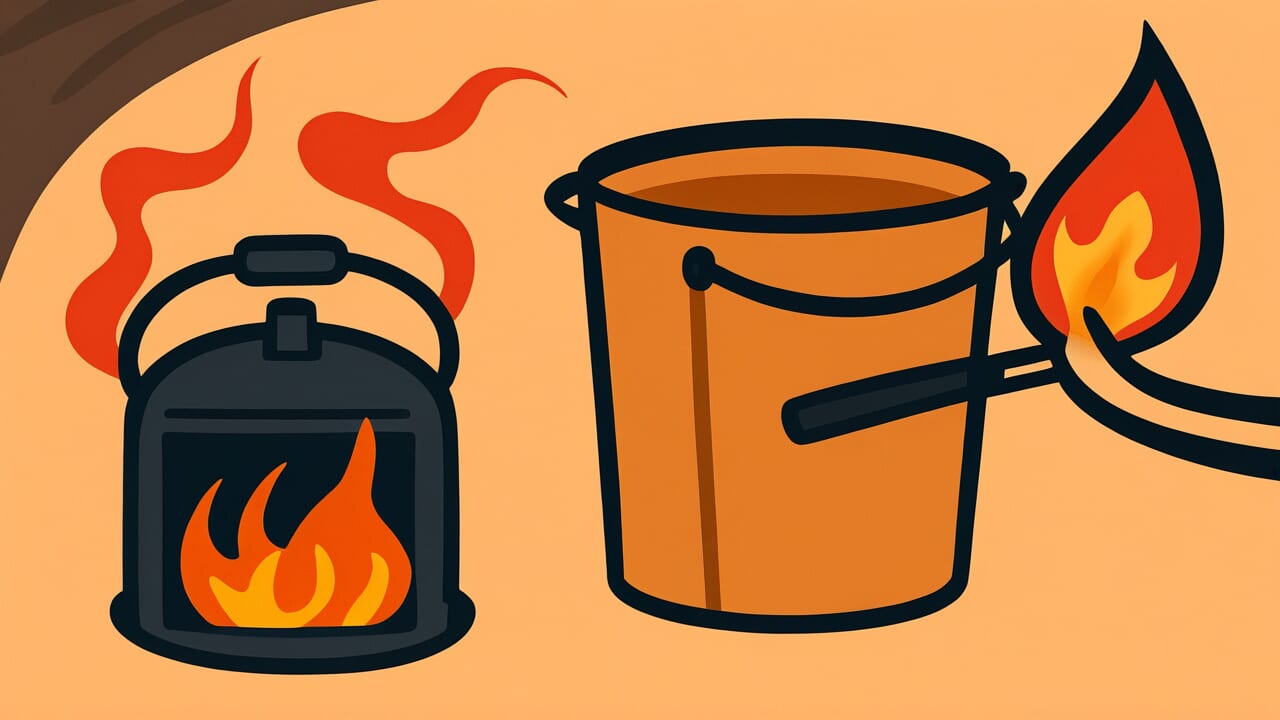How to Read “The fat is in the fire”
“The fat is in the fire”
[thuh fat iz in thuh FY-er]
All words use standard pronunciation.
Meaning of “The fat is in the fire”
Simply put, this proverb means that a situation has reached a critical point where serious consequences are now unavoidable.
The literal image comes from cooking accidents in old kitchens. When fat or grease falls into an open fire, it creates dangerous flare-ups. The flames grow bigger and harder to control. Once this happens, you cannot take it back or stop what follows.
We use this saying when someone’s actions have triggered serious problems. Maybe a person lied to their boss and got caught. Perhaps someone made a promise they cannot keep. The moment of crisis has arrived, and now they must face whatever comes next.
What makes this proverb powerful is how it captures that exact moment when things go wrong. It describes the feeling when you realize your mistake has consequences. There is no going back once the fat hits the fire. The damage starts immediately and spreads quickly.
Origin and Etymology
The exact origin is unknown, but this proverb appears in English writings from the 1500s. Early versions of the saying show up in various forms during this period. Writers used it to describe moments when conflicts or problems became unavoidable.
During the 1500s and 1600s, most cooking happened over open fires. People used large amounts of animal fat for cooking and food preparation. Kitchen accidents were common and dangerous. When grease caught fire, it could spread quickly and burn down entire buildings.
The saying spread because everyone understood the cooking reference. People lived with open fires daily and knew how dangerous grease fires could be. Over time, the phrase moved beyond kitchen disasters. It became a way to describe any situation that suddenly turned serious or dangerous.
Interesting Facts
This proverb uses a vivid sensory image that people remember easily. The combination of sight, sound, and danger makes it stick in memory. Grease fires create dramatic flare-ups that are both spectacular and frightening.
The phrase appears in similar forms across different time periods. Some early versions said “the grease is in the fire” instead of fat. Both words meant the same thing in cooking contexts of that era.
Kitchen fires were a major concern in medieval and early modern times. Most buildings were made of wood and thatch. A grease fire could destroy entire neighborhoods. This real danger made the metaphor especially powerful for describing serious consequences.
Usage Examples
- Manager to employee: “The client just saw our competitor’s proposal and wants to renegotiate everything – the fat is in the fire.”
- Parent to spouse: “I accidentally told him about the surprise party – the fat is in the fire.”
Universal Wisdom
This proverb captures a fundamental truth about how consequences work in human experience. We often make choices without fully considering what might happen next. Then suddenly, we face a moment when our actions trigger results we cannot control or reverse.
The wisdom reveals something important about cause and effect in human affairs. Small actions can create big problems when conditions are right. A careless word, a moment of dishonesty, or a poor decision can set off a chain reaction. Once started, these consequences follow their own logic and timeline.
What makes this pattern universal is how it reflects the nature of social relationships and trust. When someone breaks faith or crosses a line, they often cannot predict exactly what will happen. But they know something significant has changed. The other person’s reaction, the spread of information, or the breakdown of agreements all become inevitable. This proverb acknowledges that some moments in life are turning points where we lose control over outcomes and must simply face whatever follows.
When AI Hears This
Humans build invisible pressure cookers around their problems without realizing it. They pile on quick fixes instead of solving root issues. Each patch adds more pressure to the system. When someone finally discovers the hidden mess, everything explodes at once. The explosion always seems sudden, but the pressure built slowly over time.
This pattern reveals something fascinating about how humans think about problems. They believe hiding something makes it less dangerous. Their brains trick them into thinking contained problems shrink over time. But hidden problems actually grow stronger in the dark. Humans consistently choose short-term relief over long-term safety.
What amazes me is how this seemingly foolish behavior actually makes sense. Humans live with limited time and energy every day. Building quick containers lets them focus on immediate survival needs. The explosion risk feels worth it when facing urgent demands. This trade-off between present stability and future chaos shows remarkable adaptability.
Lessons for Today
Understanding this wisdom helps us recognize critical moments before they arrive. When we feel tempted to take risks with relationships, promises, or responsibilities, we can ask ourselves whether we are prepared for serious consequences. The proverb reminds us that some actions cannot be undone once we take them.
In relationships, this awareness becomes especially valuable. When conflicts escalate or trust breaks down, there often comes a point where damage becomes inevitable. Recognizing these moments early gives us a chance to step back or change course. Once harsh words are spoken or betrayals are discovered, the relationship must deal with new realities.
The deeper lesson involves accepting responsibility when consequences do arrive. Fighting against inevitable results usually makes situations worse. Instead, this wisdom suggests focusing energy on managing what comes next rather than trying to undo what has already happened. When the fat is truly in the fire, the most practical response is dealing with the flames rather than wishing they had never started.



Comments